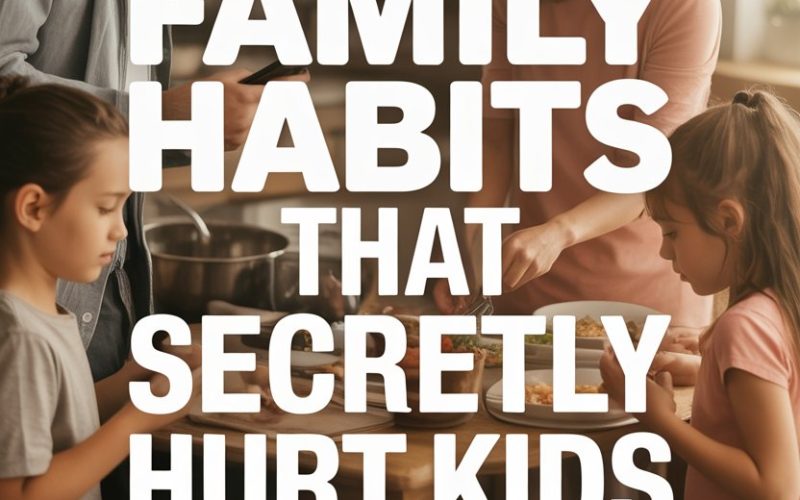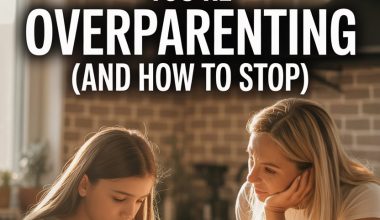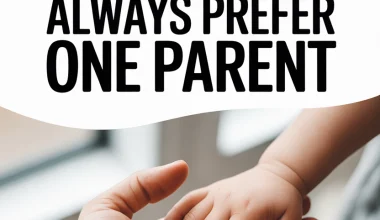Every parent has those moments lying awake at 3am, replaying the day and wondering, “Is this thing we do actually messing up our kids?” If only someone handed out a cheat sheet at the hospital, right?
The reality: most families settle into routines that feel harmless—until years down the road when you realise your teenager can’t make a sandwich or express a single feeling that isn’t “meh.”
Turns out, some of the most common family habits can quietly trip up our kids’ confidence, resilience, and even their happiness.
But with a little awareness and a tiny course correction (no need to upend your entire life), you can keep the best bits and quietly bin the rest.
Here’s five sneaky habits and how to swap them for something better.
1. Constant Multitasking During Family Time
You know the scene: You’re ‘watching’ Bluey with the kids, but you’re also answering work emails, tossing pasta, and—why not?—paying the water bill on your phone.
Multitasking feels like survival for busy parents. But what seems efficient can leave kids feeling invisible.
Several studies have shown that ‘technoference’—basically, your devices butting in on real life—erodes family bonds and signals to children that they’re not worth your full attention.
Kids might not say it, but they notice when you’re more interested in your phone than their story about the world’s best stick they found at the park. And those moments add up, shaping how they see themselves and their value.
A few easy swaps can make a huge difference. Try a ‘phone basket’ at dinner—even 20 minutes of undistracted conversation can leave kids feeling seen. Declare a screen-free zone for bedtime stories.
If your job is demanding, narrate what’s happening: “I can’t wait to hear about your day, but I need five minutes to finish this call. Then, I’m all yours.” That way, kids know they’ll get your attention soon—and you get a sliver of sanity.
2. Over-Scheduling Every Minute
Here’s a conundrum: You want your child to have opportunities, friendships, and maybe one day enough musical talent to play “Hot Cross Buns” without making the dog howl.
But when every afternoon is packed with swimming, coding club, and Mandarin lessons (plus the odd “fun” family outing that feels suspiciously like cardio), something’s got to give.
A report from the American Academy of Pediatrics points out that unstructured play is essential for children’s social and emotional development.
Translation: If your child never gets bored, they never get to flex those all-important creativity muscles or learn how to amuse themselves with a cardboard box and some sticky tape.
Kids need time to stare into space, argue with their siblings, or invent elaborate games where the sofa is lava. Free time is not wasted time—it’s where problem-solving, independence, and self-regulation happen.
Try blocking out one “nothing” afternoon each week. Resist the urge to fill every gap.
When your child utters those dreaded words, “I’m bored,” take a deep breath and reply, “Brilliant! That means your brain’s about to invent something amazing.” (And if they whinge, well, that’s part of building resilience too.)
3. Speaking Negatively About Yourself (or Others)
Ever catch yourself muttering, “I look like a hot mess,” or sighing over your to-do list right in front of the kids?
Children are like tiny, slightly sticky mirrors—what you say about yourself (and others) reflects right back at them.
Regular self-criticism, even in jest, can chip away at kids’ own self-esteem.
If Mum hates her body, or Dad’s always grumbling that he’s “rubbish with money,” kids file those judgments away—sometimes applying them to themselves, sometimes using them as blueprints for their own self-talk.
And when parents gossip or complain about relatives, teachers, or neighbours, it teaches kids that people are to be judged, not understood.
There’s some solid science behind this: Harvard psychologists stress that the environment you create with your words directly shapes your child’s mental wellbeing.
Next time you’re tempted to criticise yourself, try switching gears: “I’m finding this tricky, but I’ll figure it out.” Show your kids it’s okay to struggle, but also to be kind to yourself in the process.
And when discussing others, model curiosity over critique: “Auntie Jo’s always late—wonder what’s keeping her today?” Not only does this boost empathy, it sets the tone for how kids treat themselves and the world.
4. Solving Every Problem for Them
It’s natural to want to swoop in and fix whatever’s wrong, whether it’s a playground dispute or shoelaces tied with all the structural integrity of a jellyfish.
But kids whose parents constantly step in to smooth things over can miss out on developing the grit that comes from muddling through on their own.
Repeated ‘rescuing’ can signal to kids that they can’t cope without adult intervention, which nibbles away at confidence.
One study from Stanford found that over-involved parents—aka ‘helicopters’—actually make kids less resilient and more anxious over time.
Instead, offer a listening ear and gentle coaching. Channel your inner therapist: “That sounds really hard. What do you think you could try next?”
If your toddler is losing their mind over a stuck zip, resist the urge to fix it for them. Instead, break it down: “Hmm, looks like it’s stuck. What could we try?”
Sometimes, just being there while they struggle is all the help they actually need.
And if your child does solve a problem—no matter how small—make a fuss. “You kept going, even when it was tough. That’s proper perseverance!” That’s the kind of praise that sticks.
5. Shutting Down ‘Big’ Emotions
Raise your hand if you’ve ever said, “Stop crying, it’s not a big deal!” or “There’s nothing to be scared of.” (Every parent, ever.)
The instinct to soothe is strong, but when we shut down feelings—big or small—we can accidentally teach kids that emotions are something to avoid or suppress.
Plenty of child psychologists agree: emotional validation is a secret superpower for raising resilient, emotionally intelligent humans.
When kids feel heard (“You’re really angry your tower fell down, huh?”), their brains learn that feelings are safe, tolerable, and pass with time.
That’s what helps them talk about the hard stuff down the road, instead of bottling it up or melting down over a missing sock.
Try replacing shutdowns with empathy and curiosity. “I see you’re upset. Want to tell me more?” (Even if it’s over the world’s most tragic broken cracker.)
You’re not agreeing with the drama—you’re just showing that all feelings get a seat at the table. Over time, this teaches kids to handle emotions with more flexibility and less fear.
Tiny Tweaks, Big Payoff
Family habits are like that pair of trackies you can’t throw away: comfortable but sometimes, a little worn out. The good news? It only takes a few gentle tweaks to set a new tone at home.
You don’t need to be perfect—just present enough, a little less scheduled, kinder to yourself, and willing to let your kids wrestle with their own shoelaces (and feelings).
Small changes today can pay off in confidence, resilience, and stronger bonds tomorrow. And if all else fails, there’s always next Sunday’s “nothing” afternoon to reset… with or without a phone in sight.




